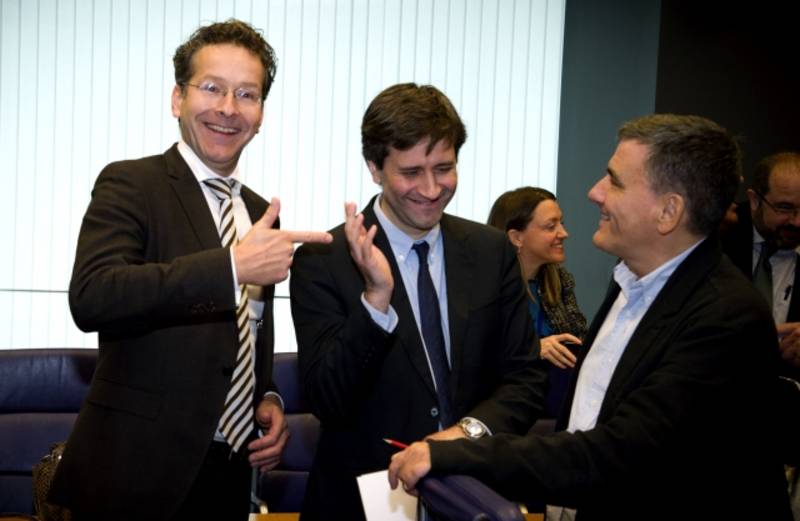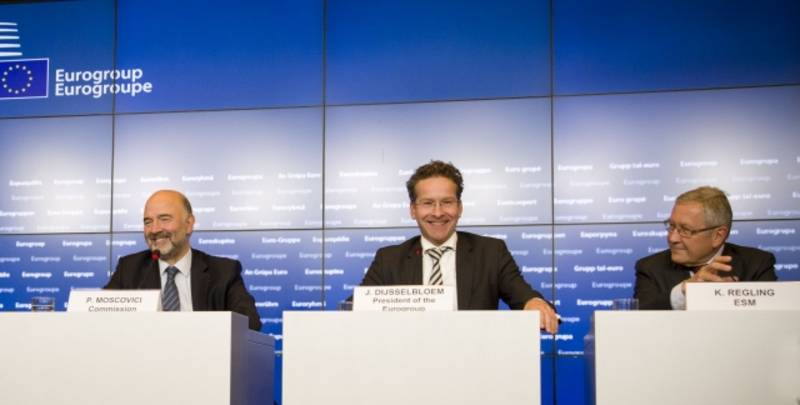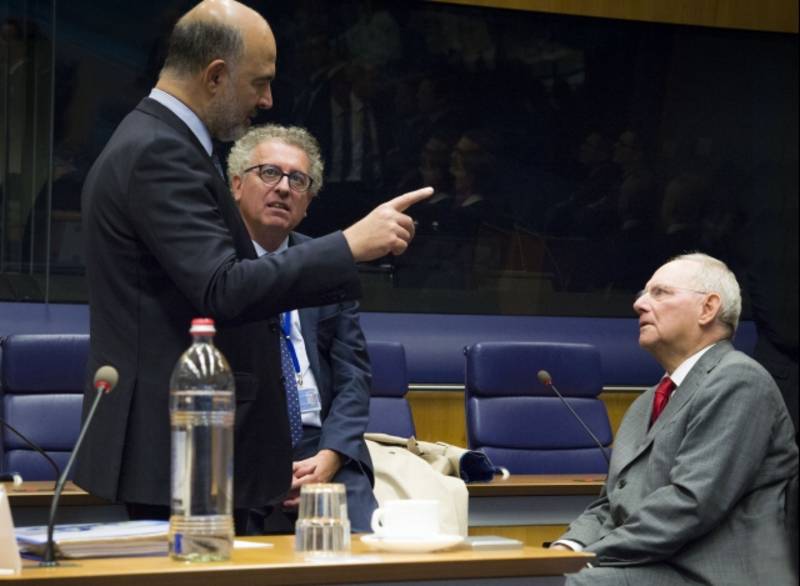Long Greek Crisis Is Causing Severe Jet-lag to the Eurogroup
Adelina Marini, October 12, 2016
 In just a single month a great change happened in the assessment of European institutions of the implementation of the Greek programme. This change does have a price and it is a mismatch in perceptions. Eurogroup chief Jeroen Dijsselbloem (The Netherlands, Socialists an Democrats) admitted Monday evening that everyone is feeling jet-lagged after their return from the annual meeting of the International Monetary Fund and the World Bank, but got contradicted by Pierre Moscovici, commissioner for economic and financial affairs (France, Socialists and Democrats), who stated that the European Commission never has jet-lag, while the boss of the euro area’s permanent bailout fund – the European Stability Mechanism (ESM) – Klaus Regling (Germany) stated that he had already recovered from it. Physical feelings do quite realistically mirror the moods towards the Greek programme, which is entering its next phase – the second review of the implementation of the third bailout programme amounting to 86 billion euro.
In just a single month a great change happened in the assessment of European institutions of the implementation of the Greek programme. This change does have a price and it is a mismatch in perceptions. Eurogroup chief Jeroen Dijsselbloem (The Netherlands, Socialists an Democrats) admitted Monday evening that everyone is feeling jet-lagged after their return from the annual meeting of the International Monetary Fund and the World Bank, but got contradicted by Pierre Moscovici, commissioner for economic and financial affairs (France, Socialists and Democrats), who stated that the European Commission never has jet-lag, while the boss of the euro area’s permanent bailout fund – the European Stability Mechanism (ESM) – Klaus Regling (Germany) stated that he had already recovered from it. Physical feelings do quite realistically mirror the moods towards the Greek programme, which is entering its next phase – the second review of the implementation of the third bailout programme amounting to 86 billion euro.
In the beginning of September, when euro area finance ministers gathered for an informal meeting in Bratislava after the summer vacation, feelings were of the familiar aggravation with Greek sluggishness in implementing the agreed measures. At the time, both the Eurogroup boss and Commissioner Moscovici shared the opinion that Greece is taking too long. “There’s no doubt that we've lost time. We didn’t go into the specifics of why and where time was lost on these different milestones. As a Eurogroup we took a more general message that summer is over”, said Mr Dijsselbloem on September 9th, when he once more placed the word “trust” on the table. “It has very much to do with trust. Trust, of course, between us, trust in the IMF who have reconfirmed that they will go to the board before the end of the year, but also trust from the outside world in Greece and the Greek economy”, said the Dutch finance minister.
"To be absolutely frank, in an ideal world we would have liked to have seen more progress at this stage. So, I fully agree with what the president of the Eurogroup has said", were the words of Mr Moscovici. As usual, he was way softer than Jeroen Dijsselbloem in adding that in the last days (preceding the September Eurogroup) there was noticeable speed-up of Greek authorities’ efforts. However, Pierre Moscovici warned: “We have to tell them clearly that they need to stick to their commitments. We must be really demanding but at the same time let's not dramatise. We're still in capacity to reach this agreement. There is a political will, there is capacity”, assured the French commissioner back then.
A month later, the press conference following the Eurogroup meeting sounded completely different. Everyone agreed that Greece has fulfilled the 15 milestones it had and there was, please note, political approval granted for the release of half the 2.8 billion euro sub-tranche – 1.1 billion euro. The remaining 1.7 billion euro will be approved probably at the ESM board of directors meeting in two weeks. Everyone, including Greece's Finance Minister Euclid Tsakalotos tried to assure that this is an entirely technical issue, not a punishment for delayed implementation. The first part of the sub-tranche - 1.1 bn euros - is allocated for debt servicing. The second part - 1.7 bn euros - is dedicated for clearing of arrears.
In Klaus Regling’s words, the reason for the delay of releasing the second part of the amount is the lack of data about the clearing of arrears in September. In July and August the Greek state had paid off all its liabilities, depleting the sum of 1.8 billion euro, poured into the special account, created for that purpose in July. Jeroen Dijsselbloem explained that no one is to blame for the delay, for data collection is not the obligation of the Greek finance ministry, but it is rather gathered by a multitude of governmental institutions. “There is a delay between the data for September and the moment all of this data are collected. It's inevitable”, said Dijsselbloem and assured there is nothing to worry about. He was convinced everything will be fine with the data. “The money will come, don't worry!” was his reply to a journalist’s question.

Greek Finance Minister Euclid Tsakalotos was brief, stating that the reasons for the delay are purely technical and “completely beyond the control - we have not got the figures for September”, he said. In his words, there is nothing to worry about, for Greece is currently in no need for money for urgent repayment of matured debt, meaning there is no maturity coming any time soon. “We don’t need any more money than 1.1 billion, for there's no big payment to our creditors before that, so this is a secondary issue”, he said in a brief statement for media after the Eurogroup meeting.
According to The Financial Times, however, the good tone after the meeting covers up several problems, one of which is the German Finance Minister Wolfgang Schäuble, who did not speak officially in front of journalists. The newspaper reports that the German minister is far from convinced in the fact that Greece had fulfilled all of its obligations and did raise the question during the meeting. Berlin’s main concern is that Greece is far from energetic in the creation of a privatisation agency, which was one of the key requirements for the setup of the third bailout programme – a demand that was particularly requested by Germany. The other issue, which is covered up by the Eurogroup’s optimistic tone, is the participation of the IMF in the third bailout programme.
Despite sending out hope in May that it will participate in the programme with money, the Fund is not backing down one inch from its claim that the current programme and Greece’s economic future beyond it are completely inadequate. At a press conference during the meetings of the IMF and the WB in Washington last week, the Director of the Fund’s European Department Poul Thomsen assured that the institution is fully committed to the programme, but the Fund’s concerns remain, as do the risks. One of these concerns is the pension reform. “There are deficits in the pension system of more than 10 percent, 11 percent a year”, said Mr Thomsen. The agreed reforms will bring 1% of GDP per annum, but there are still too many households in Greece (about 60%) falling under taxation exemptions. In Europe, for example, this group is not more than 6-7-8%, he added.
The Fund’s biggest concern remains Greece’s capability of modernising its public sector. In other words the IMF believes that Greece might succeed in achieving the set goal of a budget surplus of 1.5% of GDP by the end of the programme, utilising the proposed measures, but in the long run “there are some things that you have not made plans for yet, like the unemployment compensation, like a good welfare system. That can only be done if you really tackle your problems in the pension system”, further added Mr Thomsen.
Which are the 15 milestones, which Greece has (perhaps) accomplished?
As they are listed in the first review of the programme’s implementation in June, Greece was expected to finish the harmonisation of social security contributions by eliminating the lower base for the owners of tourist enterprises; finish the review of banks, with which it has special relationship framework agreements. This was one of the key requirements. Another key requirement was the reform of the energy market, which includes the liberalisation of the gas and electricity markets. The energy sector takes up a very large portion of the 15 tasks and also includes privatisation. Among the measures is the letting out on concession of the “Ignatia” motorway and several other road sections.
It is not very clear how have these requirements been fulfilled and to what degree. Maltese Finance Minister Edward Scicluna stated before the start of the meeting that some measures have been fully implemented, others – not so much, and this is normal. Pierre Moscovici, however, announced the start of the second review of the bailout programme, which may last until March of next year. “There is good news - the 15 [milestones] have been done. The institutions have been clear on that. So, that political deal is done. The other part is only a technical issue”, assured Jeroen Dijsselbloem.
 The European Parliament was in a completely opposite mood to the institutions. During a debate last week with the participation of Pierre Moscovici, MEPs laid heavy criticism on the bailout programme. Some statements were heavily populist, often veering away from facts and rarely to the point, but others were quite concrete. Optimistic statements were few and far apart, like the one of Roberto Gualtieri (Socialists and Democrats, Italy), who chairs the European Parliament’s economic committee. In his opinion, there is already light seen in the end of the tunnel for Greece. He expressed hope that the IMF will not feed fuel to the fire (by refusing participation in the bailout programme). Maria Spyraki (EPP, Greece) warned that the programme’s implementation is threatened by excessive taxation.
The European Parliament was in a completely opposite mood to the institutions. During a debate last week with the participation of Pierre Moscovici, MEPs laid heavy criticism on the bailout programme. Some statements were heavily populist, often veering away from facts and rarely to the point, but others were quite concrete. Optimistic statements were few and far apart, like the one of Roberto Gualtieri (Socialists and Democrats, Italy), who chairs the European Parliament’s economic committee. In his opinion, there is already light seen in the end of the tunnel for Greece. He expressed hope that the IMF will not feed fuel to the fire (by refusing participation in the bailout programme). Maria Spyraki (EPP, Greece) warned that the programme’s implementation is threatened by excessive taxation.
Alexander Graf Lambsdorff (ALDE, Germany) concluded that Greece used fake statistics to join the euro area and now the European Commission is using fake statistics to keep it in the euro area. Moscovici admitted that too much time has been wasted in Greece, but he adamantly refuted the suggestions that nothing has been accomplished. He added that he wants by the end of the year to see a deal on Greece’s debt, but the efforts all sides are needed for that to happen.
Klaus Regling, the bailout fund’s boss, automatically added at the press conference on Monday evening that since 2011 Greece has been paid through the Fund and its predecessor (EFSF) 171 billion euro. Out of the current programme Greece has been paid 28 bn euros out of a total of 86. The programme’s implementation might be going slow, but the EU is more and more willing to turn a blind eye, as it does with a number of other countries, which are not following strictly all the rules. The largest issue remains IMF’s participation, for if they do not chip in, Germany will refuse to participate and that right at the moment when it looks like Greece has finally understood that it needs to work in order to deserve its place in the euro area.
Translated by Stanimir Stoev
 Klaus Regling | © Council of the EU
Klaus Regling | © Council of the EU Mario Centeno | © Council of the EU
Mario Centeno | © Council of the EU Mario Centeno | © Council of the EU
Mario Centeno | © Council of the EU